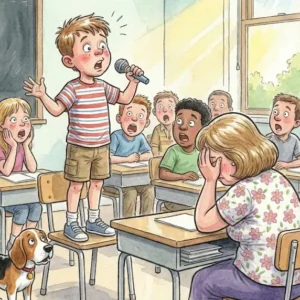We often fret about what a child will become in the future, but we overlook the fact that they are already someone today.” – Stacia Tauscher.
As parents, we frequently concentrate on the future, envisioning the adults our children will turn into. Yet, it’s crucial to appreciate who they are in the present—distinct individuals with their own thoughts, ideas, and emotions. One of the greatest gifts we can offer our children is the freedom to express themselves. This article explores why this freedom is essential for their growth and how we can encourage it effectively.

Understanding Freedom of Expression for Children
Freedom of expression allows individuals to communicate their ideas, opinions, and feelings without fear of repression, provided it doesn’t harm others. For children, this right goes beyond just verbal communication; it includes their ability to express themselves through art, writing, and other forms of creativity. Just like adults, children deserve the opportunity to convey their thoughts and feelings, whether through spoken words, drawings, or actions.
Children also have fundamental rights akin to those of adults—freedom of thought, movement, religion, and privacy. These rights enable them to voice their concerns and take part in decisions that impact their lives, including those that may differ from their parents’ views. Encouraging this freedom fosters their confidence, independence, and self-esteem.
The Importance of Freedom of Expression for Children
Allowing children to express themselves is crucial for their emotional and cognitive growth. Philosopher Stuart Mill noted that freedom of expression is vital for society as it allows individuals to share ideas, driving progress and innovation. This principle holds true for children as well—they need the chance to make their voices heard.
Self-expression helps children gain a better understanding of themselves. It enables them to explore their feelings, clarify their thoughts, and enhance their problem-solving skills. When encouraged to speak up, children learn to advocate for their rights and those of others.
1. The Significance of Children’s Rights to Expression
International laws, such as Article 13 of the Child Rights International Network (CRIN), safeguard children’s freedom of expression. This article asserts that every child has the right to express themselves through various mediums, including speech, writing, art, and media. While this right may have certain restrictions for the sake of public safety or the rights of others, its fundamental aim is to enhance a child’s ability to seek and share knowledge.
By providing children with the opportunity to express themselves, we help them recognize when their rights are being upheld or violated. Furthermore, it instills in them the importance of advocating for the rights of others, fostering a sense of responsibility and empathy.
2. Balancing Rights and Responsibilities
With the freedom to express themselves comes the responsibility to respect others’ opinions. It’s crucial to teach children that their words have power and that they must listen and be open to differing viewpoints. Disagreements are a natural part of communication, and children should learn how to engage in respectful discussions, even when opinions differ.

Parents should also guide their children on when to disengage, especially in today’s digital landscape. If they encounter hate speech or misinformation, such as harmful rumors on social media, it’s essential to teach them to block or report such content instead of perpetuating it.
3. Establishing Healthy Boundaries for Expression
While it’s vital to allow children the freedom to express themselves, parents must also establish healthy boundaries. Freedom of expression does not equate to allowing children to say or do anything without consequences. Instead, it means creating a safe environment where they can share their thoughts without fear of punishment while understanding the importance of respect and kindness.
Children should feel free to voice their opinions but must also recognize the impact of their words. As George Washington remarked, “If freedom of speech is taken away, then dumb and silent we may be led, like sheep to the slaughter.” It’s essential to guide children in using their voices responsibly rather than silencing them.
4. Fostering Creativity and Self-Expression
Creativity is a natural outcome of freedom of expression. Children are inherently imaginative, and nurturing that creativity can have lasting benefits for their development. When given the opportunity to create, children not only build confidence but also develop problem-solving abilities and resilience.

For instance, encouraging a child to draw or keep a journal can be an excellent way for them to articulate their feelings and ideas. If they express boredom, it’s important not to dismiss their feelings. Instead, gently encourage them to explore various activities, whether it’s drawing, building, or crafting. The goal is to provide them with the tools to explore their creativity meaningfully.
5. Building Confidence Through Expression
Allowing children to share their thoughts without fear of judgment enhances their confidence. When children feel heard, they are more likely to develop effective communication skills and a strong sense of self-worth. This confidence is crucial as they grow, enabling them to navigate social situations and face challenges with resilience.
Encouraging self-expression also cultivates empathy. As children learn to articulate their thoughts, they become more adept at understanding others’ feelings, a valuable skill for building healthy relationships and managing social interactions.
6. Creating Opportunities for Expression
To support your child’s creativity and freedom of expression, consider setting aside a space in your home where they can explore their ideas. This doesn’t need to be elaborate—just a small area with access to tools like paper, crayons, or blocks. By providing resources and space for creativity, you empower them to express themselves in their unique ways.

Encourage them to share their creations, but refrain from being overly critical. It’s important to praise their efforts and creativity, even if the results don’t align with your expectations. The process of expression is what truly matters.
Conclusion
Freedom of expression is essential for a child’s growth, enabling them to communicate, explore, and comprehend the world around them. By granting your child the space and resources to express themselves, you’re helping them become confident, empathetic individuals. As parents, it’s our role to guide them, set healthy boundaries, and teach them to use their voices in respectful and responsible ways. In doing so, we prepare them for a world where their thoughts and ideas can create a meaningful impact.





